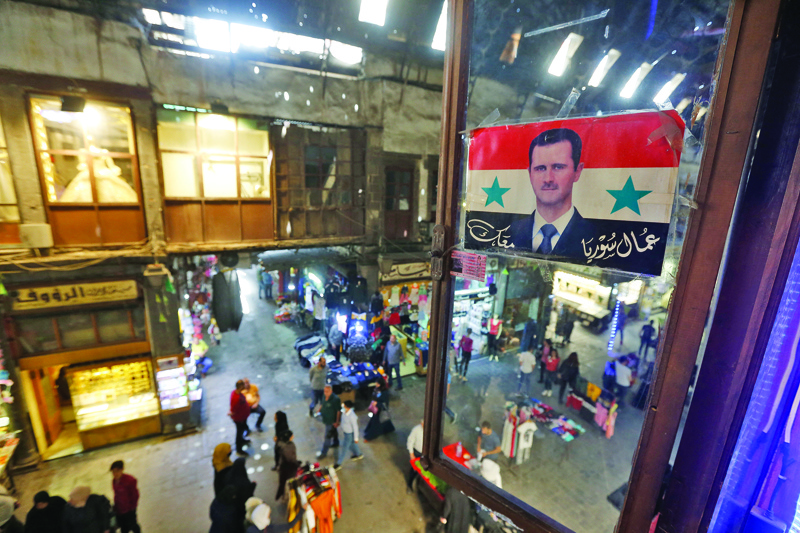 DAMASCUS: A poster depicting Syria's President Bashar Al-Assad superimposed upon the national flag with text in Arabic reading "Syria's workers are with you" is seen on a window in an upper floor of the historic Hamidiyah souk in Damascus yesterday. Assad has submitted his candidacy for next month's presidential election yesterday. - AFP
DAMASCUS: A poster depicting Syria's President Bashar Al-Assad superimposed upon the national flag with text in Arabic reading "Syria's workers are with you" is seen on a window in an upper floor of the historic Hamidiyah souk in Damascus yesterday. Assad has submitted his candidacy for next month's presidential election yesterday. - AFP
THE HAGUE: The global chemical weapons watchdog agreed yesterday to strip Syria of its voting rights in an unprecedented punishment after a probe blamed Damascus for poison gas attacks. Syria will also be banned from holding any offices at the Hague-based Organization for the Prohibition of Chemical Weapons (OPCW) over its repeated use of toxic arms against civilians.
A two-thirds majority of the OPCW's member states voted in favor of the sanctions, the first time they have been meted out to any country in the agency's quarter-century history. The measures are in response to an OPCW investigation last year that found the Syrian air force had used the nerve agent sarin and chlorine gas in three attacks on the village of Lataminah in 2017.
"The member states of the OPCW have sent a strong message: repeated use of chemical weapons by Syria is unacceptable for the international community," the French delegation to the watchdog said. Britain said it was a "vital step to maintain the credibility of the Chemical Weapons Convention". Syria and its ally Russia have consistently denied that Damascus has used chemical weapons during the 10-year civil war, arguing that the watchdog has become politicized by the West.
'Rights and privileges'
France introduced a motion on behalf of 46 countries also including Britain and the United States to deprive Syria of "rights and privileges" over the 2017 attacks and its failure to declare its chemical weapons. Eighty-seven countries voted in favor of the motion, 15 including Syria, Russia, China and Iran voted against, and 34 abstained, OPCW officials said. "In light of this result the draft resolution is adopted," said Jose Antonio Zabalgoitia Trejo, the chairman of the meeting of the OPCW's member states.
Syria's rights will remain suspended until member states decide that Damascus has fully declared all of its chemical weapons and weapons-making facilities, the motion says. These include the right to vote in either the annual conference of all member states or the OPCW's executive council, to stand for election in the executive council, or to hold any office in the agency, it said.
The OPCW was created to uphold the Chemical Weapons Convention and says it has helped destroy 97 percent of the world's chemical weapons stocks. It won the Nobel Peace Prize in 2013. The regime of Syrian President Bashar al-Assad agreed in 2013 to join the OPCW and give up all chemical weapons, following a suspected sarin nerve gas attack that killed 1,400 people in the Damascus suburb of Ghouta.
Syrian President Bashar Al-Assad, who has been in power for 21 years, has submitted his candidacy for next month's presidential election, state media said yesterday. The 55-year-old is widely expected to secure a fourth term in office by a comfortable margin in the May 26 vote, which observers have already said would be far from free and fair.
"Parliament was informed by the high constitutional court that Bashar Hafez Al-Assad has filed a request" to run in the upcoming poll, the official SANA news agency said. Five other candidates have so far filed applications with the high constitutional court, it said.
The little-known contenders include a former lawmaker and several businessmen. Presidential hopefuls have until April 28 to put forth their candidacy for the second such vote to be held since the start of the country's civil war a decade ago. They will have to garner support from at least 35 members of the 250-seat parliament, which is dominated by Assad's Baath party.
They must have lived continuously in Syria for at least 10 years, meaning that opposition figures in exile are barred. The previous presidential election was held in 2014 and saw two candidates run against Assad after a constitutional amendment allowing for a multi-candidate ballot. Only two other candidates were approved by the Assad-appointed constitutional court and the incumbent won with 88 percent of the vote. - AFP
.jpg)



